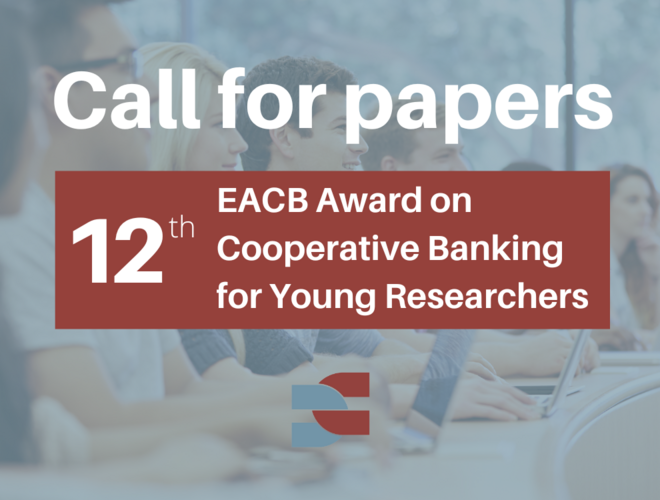For another consecutive year, the European Association of Co-operative Banks (EACB), in collaboration with its Academic Advisory Group, is pleased to announce its competition for young researchers for best papers in the field of cooperative banking.
I. Addressees
The competition targets young researchers up to the age of 35 years (i.e. applicants should be born after the 30 September 1988). Co-authored papers are also welcome, as long as all authors meet the age requirement.
II. Research Themes
The papers should look into the topic of cooperative banking. Contributions relating to other types of financial cooperatives will also be considered, provided they address aspects and reach conclusions that are at the same time relevant for cooperative banking. Papers that compare cooperative banks with other types of credit institutions (e.g. profit maximising banks, shareholders banks, savings banks, etc) will likewise be taken into account. The judges will be looking primarily for contributions from the academic fields of economics, finance and accounting, corporate governance or management, but may also examine any topics specifically related to cooperative banking, such as:
• Contribution of cooperative banks to competition in European banking
• Over-capacity in European Banking: possible implications for cooperative banks
• Diversity in banking: The role of cooperative banks
• Impact of cooperative banks on financial stability
• Impact value of cooperative banks on social and financial inclusion
• Contribution of cooperative banks to sustainability of society and the environment
• Cooperative Banks: ‘Creating member value’
• Culture in stakeholders value (cooperative) banks: is it different from shareholder banks?
• Are there distinct characteristics of cooperative banks (the cooperative difference)?
• Relative performance of cooperative and shareholder banks
• Challenges and opportunities of innovation and digitalisation for cooperative banks
• Challenges and opportunities of open banking for cooperative banks
• The specific governance of cooperative banks and the evolution of their business model
• Regulatory challenges for cooperative banks
• International comparison of cooperative banks
III. Formal Criteria for Contributions
• The papers must be written in English.
• The submitted papers should follow the standard format of scientific journals.
• The papers should contain new and original work by the authors.
• The word limit is 10,000 words maximum including the references and tables.
• Contributions should be delivered both in PDF and in Word format to undergo a plagiarism check upon submission.
• Contributions will be accepted provided that they have not already been published in other scientific journals or books before the 30 September 2024. Papers that will be forthcoming in a publication after 30 September 2024 will be considered.
IV. Submission Details
The deadline for the submissions is the 30 September 2024.
The submissions should be sent to eacbaward@eacb.coop.
For any other inquiries, please contact the EACB secretariat’s Advisor to the Management: Eva Miller eva.miller@eacb.coop.
V. Selection Process and Criteria
The EACB secretariat will direct all contributions received to the EACB Award Scientific Committee, which will assess them in the weeks following the deadline.
The committee’s selection criteria are:
• the contribution the paper makes to the scientific literature,
• the rigor of the argumentation,
• the clarity of exposition and policy relevance.
VI. Award
The author(s) of the winning paper will be awarded a prize of 2000 €. The selected paper will receive recognition via publication on the EACB website and the author(s) will get the opportunity to present their paper during a meeting of the EACB Academic Advisory Group or in the context of a public event of the EACB. The winners will be announced in the beginning 2025.
VII. Scientific Committee
The scientific committee of the EACB Award is composed of highly respected professors from renowned European universities who specialise in the field of financial cooperatives and comprises:
• Silvio Goglio, University of Trento, Italy (Chair)
• Yiorgos Alexopoulos, Agricultural University of Athens, Greece
• Hans Groeneveld, University of Tilburg and Rabobank Nederland, Netherlands
• David Llewellyn, University of Loughborough, The United Kingdom
• Eric Meyer, University of Muenster, Germany


